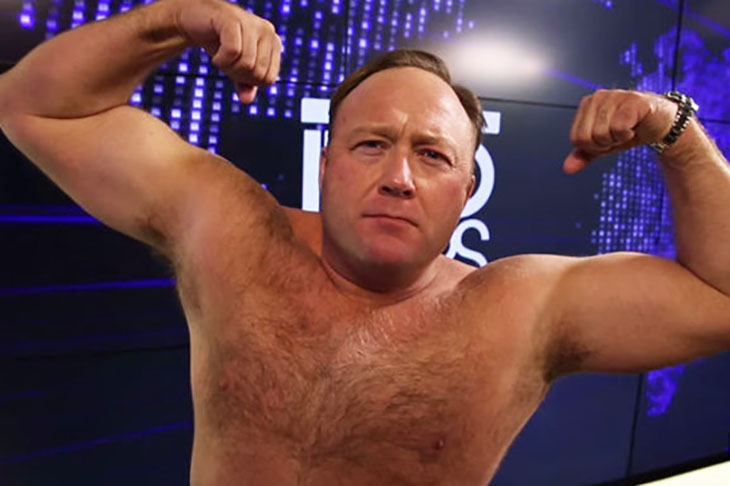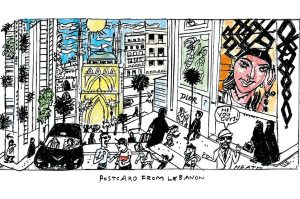If free speech means anything, it has to mean freedom for unpopular speech by despicable persons. The American Civil Liberties Union, which lately has taken to toying with the idea of criminalising catcalling, once understood this, to the point where it was willing even to defend the right of Nazis to march through the largely Jewish suburb of Skokie, Illinois.
Alex Jones is not a Nazi, but he is often despicable, never more so than when lying about the mass murder of schoolchildren at Sandy Hook Elementary School in Newtown, Connecticut. He’s being sued for that by the victims’ families, and on a purely moral level, if not necessarily a legal one, he deserves to lose.
What Jones does not deserve, however, is to be kicked off of Facebook, the Apple iTunes store, and YouTube, all of which announced today that they are pulling pages, podcasts,and videos featuring Jones. Spotify had already cracked down on him. Jones has become a digital un-person. He stands accused — and convicted by the companies’ private internal judges — of a political offense called hate speech. He is being squelched not for legal reasons, but for social ones. He is a sinner.
Yet no one can pretend this is a recent development: Sandy Hook was six years ago, and Jones has been around a lot longer than that. Only now have the major tech companies decided in unison that his words may not be heard. This does not suggest that an openly known and consistently enforced corporate standard for morally edifying speech is being enforced. It suggests that these companies and their leaders are simple cowards who have given in to online mobs of left-wing activists enraged by the presidency of Donald Trump. But perhaps the public pressure is less important than the unseen pressures within the culture of these powerful companies. Whatever the ratio of influence, it’s a good bet that external and internal pressure work toward the same end: conformity to a strict of permissible speech with a distinctly progressive ideological tilt.
The usual excuse offered for these companies is that they are, after all, private entities, which are free to regulate what may be said on their platforms in any way they see fit. The First Amendment protects public speech, but Facebook and YouTube and iTunes are not public spaces. Alex Jones has no right to say anything through their mediums.
That is true. It is also seriously illiberal in a way that is more threatening than anything Jones himself says or does. Free speech cannot be restricted to a narrow legal definition and still be free enough to matter. Most of life—thank God!—is private rather than public, in the sense of being within the domain of government supervision, in a free society. (It’s different in totalitarian societies, of course.) Most “public” discourse is carried out through private means. If those means are denied to dissenters, the effect is hardly any different than if the government itself suppresses speech. Though private censors may not have the power to sentence Alex Jones to a jail term, as government censors potentially could do, private censors can wield the powers that they do have arbitrarily and partially, without the constraints that apply to governments under law. Their powers are more constrained at the absolute limit, but far less constrained within that limit. And even the absolute limit can be passed once a mob is sufficiently incensed: there are left-wing militants in the streets who would gladly use force to silence someone like Jones.
A legally free society and an actually free society are two different things. The former may be a prerequisite for the latter — though when Alexis de Tocqueville considered the relative freedom of opinion in aristocratic and monarchical societies, on the one hand, and democratic societies, on the other, he found the most freedom where (some) people enjoyed a secure status that could not be revoked on account of their unpopularity. These model aristocrats — not much in evidence by the end of Bourbon France, to be sure—also the habit of thinking for themselves and the confidence to do so. By Tocqueville’s lights, a free society is one in which the state does not unduly constrain speech, nor does a tyranny of the majority prevail over opinion. And the tyranny of the majority is not just about numbers: an activist minority that insists it speaks for the equality of all can be the instrument of moral tyranny. The danger for Tocqueville lay in democratic ideology more than in democracy itself.
This doesn’t mean that the wide-open standards of the First Amendment have to apply to private mediums. But it does mean that if robust freedom of expression is to survive, platform providers like Facebook, Google, and Apple must err on the side of error — the side of the sinners, and not the side of the saints. Draw the line where government could not draw it in Skokie, Illinois, but draw it closer to the old liberal understanding of the First Amendment than to today’s self-righteous and censorious progressive mentality.


















